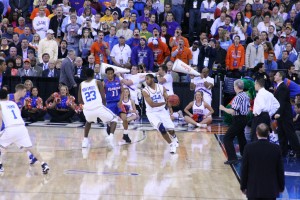Working Hard off the Ball in Offense
Working hard off the ball is one of the truly poorly executed parts of team offense. Many payers move through the motions when not holding the ball or not in the primary scoring position for the offense. Even the best, well drilled teams struggle to maintain the ethos of working hard off the ball throughout a game or even more to the point, through a whole possession.

Players often respond with a stunned look when confronted with the poor habit of pace off the ball especially when applied to them. Additionally they also challenge in moments of defence of their own personal ability about why it matters and how it affects the game overall. This point is at the root of the matter, the majority of players because they have been allowed to play the game in a particular fashion never realise how easily they can find a scoring opportunity just by doing the small things right and with pace.
So why working hard off the ball? There are an abundant number of reasons to develop this great habit.
The primary reason is it creates opportunity not exposed at a slower pace. An example of this is in the setting of an on-ball screen. The screener must create a lead initially before getting to the line of the ball and sprinting to set the screen. There are two phases to this movement. The first is the cut to the basket, which if not defended effectively should result in a simple scoring opportunity. Is this effective all the time? Of course not, but this cut is greatly more effective if it has been done all game and in the third quarter defensive players become fatigued.
Secondly the screener if they move to set the screen at pace this will speed up the movement for all players involved. This means there is less time for the defence to communicate, which leads to an increased chance of confusion and as any person who watches a lot of two man plays in basketball anything can happen once the ball is on the dribble. At pace it becomes harder to guard this action because everyone seems to be in motion, this results is bigger gaps and weaker help defence rotations all of which are of benefit to the offense.
Another scenario is the probably the most basic offensive movement, the cut to the basket. Watch any game of basketball and at least half of the time the basket cuts are executed at a slow and methodical pace. If you can find a player who cuts at a high percentage of the time to the basket hard, with purpose and performs the right technique (creates a lead, etc.). Right from the start of the game this player will expose scoring opportunities. They might not always get the pass, but they will have opportunity. This player does not have to even fatigue their player they will be able to score from the start of the game because if done right the cut to the basket is effective against moderate defence.
Additionally working hard off the ball provides one very specific change to a team who adopts this concept. It will change the tempo for your team and pull apart the defence of your opponents. Defenders like to be able to communicate, they like being able to maintain vision and they especially like to make a deliberate decision in help defence. At pace all three of these things become a luxury the defence cannot afford. Like with fast break and transition offense the more your team practices working hard off the ball the easier it will become for them to perform under the prolonged stress of a game.
It seems too simple for working hard off the ball to really be all that effective, but next time you are reviewing some game tape or maybe watch a game of basketball at any level. Look and break down each movement off the ball, what opportunities would be present if the offensive player was one step quicker?
Finally, working hard off the ball is not excuse for poor execution of technique. Players should learn not to cut corners and sacrifice good technical development, but instead learn to do things with greater intensity and pace.






Leave a Reply